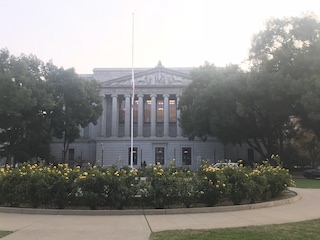On December 11, 2019, Sacramento County Sheriff’s Deputies Nicholas Sareeram and Joshua Langensiepen were assigned to the gang suppression unit and were patrolling in their marked vehicle when they spotted a gold Chevy Impala with tinted front windows in violation of Vehicle Code § 26708.5.
They positioned their patrol car behind the Impala and ran a record check and determined the Impala was owned and being driven by Derrick J. Blakes, whose license was suspended. Dispatch also advised the officers that Blakes had a prior arrest for being a felon in possession of a firearm.
Detective Sareeram initiated a traffic stop based on the window tint violation and the suspended license. Mr. Blakes then pulled over after about a tenth of a mile, into a nearby parking lot off the main street, without any display of impairment. In speaking with Blakes, Sareeram smelled the odor of marijuana coming from Blakes’ car, but did not know if it was freshly burned or whether it had been extinguished in the short time it took Blakes to pull over.
Sareeram then asked Blakes to exit the vehicle, which Blakes first refused, raising Sareeram’s suspicions, but then complied. Sareeram then completed a pat-down search of Blakes, which revealed nothing.
The officers then decided to tow the vehicle, rather than permit Blakes to continue driving on a suspended license. Sareeram then told Blakes he would be searching the interior of the car because he smelled burnt marijuana from within the car and because Blakes' license was suspended. He stated he would be conducting “an inventory search incident to a tow.”
He testified later at a hearing on a motion to suppress that he believed the smell of burnt marijuana gave him probable cause to search the vehicle and did not seek a warrant before doing so. He then found a digital scale with green and white residue on it. He also found prescription bottles and an empty handgun on the passenger rear seat. Also found was a black backpack with different identification cards, driver’s licenses and credit cards.
Blakes was then arrested and charged with being a felon in possession of a firearm (Penal Code § 29800(a)(1)), driving without a valid license (Vehicle Code § 12500(a)), appropriation of lost property by finder (Penal Code § 485) and possession of a controlled substance (Business & Professions Code § 4060). It was also alleged that he suffered a prior serious felony conviction and a prior strike (Penal Code §§ 1192.7(c), 1170.12).
On November 6, 2020, Blakes filed a motion to suppress, which was denied. The judge determined that the search was the product of a lawful impound. Colorado v. Bertine (1987) 479 U.S. 367, 371, 93 L. Ed. 3d 739, 741.
 Court of Appeal Third Appellate District Sacramento
Court of Appeal Third Appellate District Sacramento
Blakes then appealed to the Third Appellate District Court in Sacramento, which reversed the trial court. The Third Appellate District began its analysis by noting that in 2016, voters passed Proposition 64, the Adult Use of Marijuana Act, which legalized possession of up to 28.5 grams of cannabis by individuals aged twenty-one and older.
Notwithstanding any other proscription by law, Health and Safety Code § 11362.1(c) provides that “[c]annabis and cannabis products involved in any way with conduct deemed lawful by this section are not contraband nor subject to seizure, and no conduct deemed lawful by this section shall constitute the basis for detention, search or arrest.” Thus, this section does not apply when the totality of the circumstances gives rise to a fair probability that an existing cannabis regulation was violated when the search occurred. People v. Fews (2018) 27 Cal. App. 5th 553, 563.
Section 11362.1(c) “fundamentally changed the probable cause determination by specifying lawfully possessed cannabis is ‘not contraband’ and lawful conduct under the statute may not constitute the basis for detention, search or arrest.” People v. Hall (2020) 57 Cal. App. 5th 946, 954.
However, there are two possible illegal uses of marijuana that could have supported probable cause to believe a crime involving marijuana was being committed, had there been sufficient evidentiary support: driving under the influence of marijuana (Vehicle Code § 23152(a)) and driving with an open container of marijuana (Vehicle Code § 23222). However, the evidence presented at the preliminary hearing did not carry the burden of showing sufficient evidence of proving probable cause to justify the warrantless search. The prosecution presented no evidence that Blakes was impaired; no sobriety test was administered and there was no evidence that Blakes drove erratically before the stop. Likewise, there was no evidence either detective observed an open container before Blakes’ car was searched.
Thereafter, the inventory search was improper as well. There was an investigatory pretext for an impound search. “An inventory search conducted pursuant to an unreasonable impound is itself unreasonable.” People v. Torres (2010) 188 Cal. App. 4th 775, 786. “The decision to impound the vehicle must be justified by the community caretaking function ‘rather than a suspicion of evidence of criminal activity because inventory searches are conducted in an absence of probable cause.” Torres, at 787. Here, there was no evidence that Blakes’ car blocked traffic or was at risk of theft or vandalism; the car was legally parked in a public parking lot. The impound decision was motivated by an investigatory purpose.
Therefore, the Third Appellate District issued an order to the trial court to vacate its order denying Blakes’ suppression motion and to enter an order granting the motion.
The citation for the Third Appellate District Court ruling discussed above is People v. Derrick J. Blakes (3rd App. Dist., 2021) 72 Cal. App. 5th 904, 287 Cal. Rptr. 3d 799.
For more information about probable cause to search based on the odor of smoke or pot, please click on the following articles:
 Court of Appeal Third Appellate District Sacramento
Court of Appeal Third Appellate District Sacramento